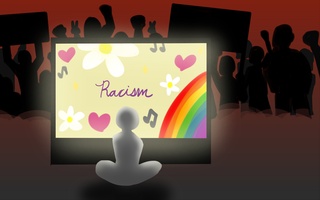In a recent post on The Voice, an anonymous blogger described five types of students one would encounter at a campus recruiting event. Among a few standard college clichés of hipsters, bros, and ass-kissers, the author added a single racial category to the mix: The “indistinguishable,” “sort-of gushy, sort-of whiny” Asians.
The language in The Voice’s piece was nothing new or exciting. It didn’t shock us. It didn’t outrage us. For as long as we can remember, we’ve seen Asian Americans portrayed as lacking in individuality and personality. In much of American society, even among those who are usually quite conscientious about racial language, jokes about Asian Americans are familiar and socially acceptable, and the group has become an easy, permissible target for racial humor. Our experience actively promoting awareness of Asian American issues over our last three years at Harvard should have primed the three of us to react quickly to the controversial post, but even we had become desensitized. After all, no one wants to be that person who can’t take a joke.
But let’s be clear about the type of joke that the blog post actually employed. Satire, which the author claimed as his or her purpose, is defined as the ridicule of human folly and vice. If satire is constructed to lampoon stereotypes or to highlight a group's ridiculous treatment, it both entertains and illuminates a ludicrous aspect of our society. The audience comes away comprehending the absurdity of prejudiced behavior.
In contrast, the blog post on The Voice did not ridicule how common and foolish it is to think that all Asians look and behave the same; instead, the piece just repeated that exact mockery, placing the fool’s cap on the Asian, not the racist. Unlike effective satire, careless racial humor mocks not the irrationality of racism, but the racial group itself. Within the audience, many miss the underlying implications, laugh the joke off, and internalize yet another depiction of Asian Americans as uniformly uninteresting or otherwise unpleasant people.
Let’s provide some context for these racial jokes about Asian Americans. Unlike other minority groups, Asian Americans are expected to keep quiet about prejudice and just appreciate that the “Model Minority” stereotype is a positive image, even if false. Repetition of careless racial humor then plays right into this expectation that Asian Americans won’t speak up, making people comfortable with derogatory depictions of this particular group. As Jasmine Y. Miller ’13 identified to The Crimson, these negative portrayals include the “Perpetual Foreigner” and “the idea of Asians as an non-individuated mass,” both of which were at the root of anti-immigration, anti-miscegenation, and wartime internment policies in 19th and 20th century Asian American history. Today, an environment that still readily, comfortably accepts such perceptions is the foundation for serious and often unaddressed manifestations of modern anti-Asian racism, which include school bullying, workplace discrimination, political exclusion, and racial violence.
We are not asserting that casual prejudices directly result in oppressive policies and discrimination, but they are nonetheless damaging. Viewing Asian Americans as un-American, anti-social, segregated, indistinguishable, and uncharismatic perpetuates our exclusion from boardrooms, politics, and the media. These perceptions hurt us personally as well, for example when we see that our blockmates, teammates, and classmates accept them as nothing more than amusing, or when we realize we must overcome them each time we meet someone with a subconscious pre-conception. So if we ourselves laugh and stay silent, we signal our acceptance of the stereotypes that ultimately damage Asian America’s position in society. We do a disservice to victimized individuals and marginalized groups if we fail, especially in an environment like Harvard’s, to challenge the beliefs exhibited in casual racial mockery.
Given that anti-Asian racism remains a reality for many American citizens and even members of the Harvard community, we encourage our peers to be aware of the underlying issues in the blog post and the campus dialogue that it sparked. This humor piece and the ensuing discussion remind us that the beliefs we hold are incubated during these formative college years. But we don’t have to absorb problematic stereotypes about certain groups of people passively. Instead, our time at Harvard is an opportunity to model the values we want to see in society at large. Let us hold our community accountable for informed and responsible discourse about race. If we are aware of the implications of our words, we can more effectively utilize humor to dismantle racism rather than to perpetuate prejudice.
Jenny Ye ’13, a computer science concentrator in Kirkland House, is President of the Institute of Politics. Joselyn A. Lai ’13, an economics concentrator in Quincy House, is President emeritus of the Harvard-Radcliffe Asian American Association. Scott J. Yim '13, a biomedical engineering concentrator in Quincy House, is Second Class Marshal of the Class of 2013.
Read more in Opinion
Careers with Chinese CharacteristicsRecommended Articles
-
Long Duck Dong's DamageA sian Americans hold a unique position among ethnic groups in the United States. As part of the most recent
-
The Model What?"If you’re serious about Asian American studies, you’ve come to the wrong school.” This statement greets prospective students and first-years
-
"No, Racial Discrimination" at Harvard, Orders Corporation"It is Harvard's principle that there should be no racial discrimination among our students." This dictum, handed down by the
-
Unions NowThe ticklish problem of racial discrimination that has been consistently side-stepped during peacetime complacency is now on the fire and
-
 The Reality of Racism
The Reality of Racism













